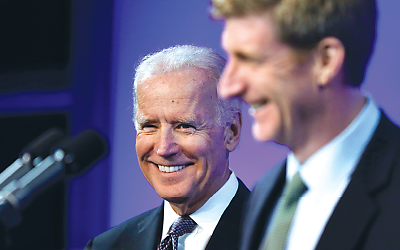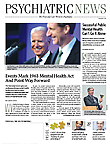Whether by design or chance, the Kennedy Forum gala and conference in Boston last month highlighted a confluence of events of major significance for people with mental illness and those who care for them.
In part, the events commemorated President John F. Kennedy’s 1963 Community Mental Health Act. The driving force was former member of Congress Patrick Kennedy, a nephew of the late president. Patrick Kennedy has spent his postcongressional career leading efforts to improve mental health and substance abuse research and services.
The 1963 mental health act marked a major change in how people with mental illness were perceived in the United States, said Herbert Pardes, M.D., a former APA president and former director of the National Institute of Mental Health, who spoke at the conference.
Historically, people with mental illness were treated with fear, hostility, and isolation, said Pardes. “But the act called for placing mental health centers in communities, not in remote rural areas.”
Implementation of the Community Mental Health Act was only partially successful, he pointed out. Just half of the planned 1,500 mental health centers were built, and they were accused of not caring for the most seriously mentally ill patients.
However, aspects of the legislation also presciently resonate with contemporary federal mental health policy, noted Substance Abuse and Mental Health Services Administration Administrator Pamela Hyde, J.D.
President Kennedy’s messages to Congress in conjunction with the Community Mental Health Act legislation included references to financing mental health care in the same way as other medical services, the need to overcome disparities, a nod toward what would be called “recovery” today, and references to social determinants of health, Hyde noted.
In addition, current actions extend the “symbolic inspirational power” of the 1963 legislation, said APA President Jeffrey Lieberman, M.D.
“The 1963 act was the first legislation to truly envision how mental health care could be provided in a much more humane and much more effective way in our society,” said Lieberman. “Today, you have the Affordable Care Act being rolled out and the final rule on the mental health parity act being issued soon.”
Indeed, the long-term historical trend following the 1963 act highlighted the interplay between the overarching vision of fundamental reform and the need for incremental changes along the way, said Howard Goldman, M.D., Ph.D., a professor of psychiatry at the University of Maryland and editor of Psychiatric Services. The evolution of the vision and smaller, pragmatic advances over the years frequently received bipartisan support, he said.
Kennedy may have been the quintessential Democrat, but Republican President George W. Bush’s New Freedom Commission called for major changes in mental health services and research, Goldman pointed out. Also, the Mental Health Parity and Addiction Equity Act, passed in 2008 during Bush’s administration, helped prepare the way for parity language in the Affordable Care Act.
“We need a strategic vision of where to go, and we need strategic incrementalists to help us get there,” said Goldman. “So looking through the historic lens, I think the future looks quite bright.”
Pardes cautioned that there were likely to be obstacles along the way to a better mental health care system.
“We’ve made a lot of progress since 1963, but we still have a long way to go,” he said. “Simply passing laws is not enough. We must make sure the laws are observed.”
Doing so will take vigilance and oversight of how parity is implemented, emphasized Patrick Kennedy. “We need to hold people accountable for what works.”
The conference may have been another restarting point for the field, suggested APA Assembly Speaker Melinda Young, M.D.
“The primary value was bringing together professionals from all fields of mental health and giving us an opportunity to talk about some of the big ideas, like parity and the Affordable Care Act—and how they are going to play out,” Young told Psychiatric News. “Organizations like APA can educate our members about what lies behind the Affordable Care Act, as well as how we can help implement parity and then begin to collect the information coming back from practitioners.”
Kennedy closed the Boston conference by urging attendees to prioritize policies and then concentrate on the factors that have the greatest leverage to improve the whole world of mental health care.
The night before the conference, the Kennedy Forum held a gala fundraiser at the John F. Kennedy Presidential Library at which Vice President Joseph Biden and Secretary of Health and Human Services (HHS) Kathleen Sebelius spoke.
Sebelius announced a long-awaited major step—that HHS will “shortly” publish final rules for the 2008 parity law.
During his remarks, Biden noted that advances in the neurosciences have to be coupled with a major effort to end the stigma that keeps people with mental illness from seeking care.
“In 2013, the brain is the new frontier,” he said, using the phrase that characterized President Kennedy’s administration. “It’s time to approach and explore the brain in ways we haven’t done before.”
Recent research initiatives from the Obama administration will eventually lead to the expansion of that knowledge, but brain research is only half the battle, he said.
“Too many treatments for mental illness and substance abuse go unused, Biden pointed out. “And too many people are left untreated and still suffer silently. The earlier help is available, the better the chance of recovery will be.” ■


